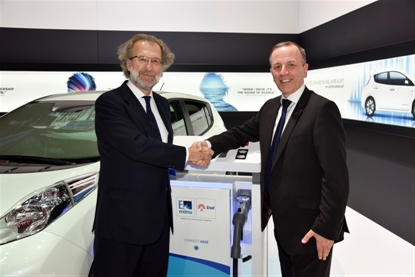Nissan and Spanish utility Endesa have announced in a press release that they
Signed a ground-breaking agreement at the 85th Geneva International Motor Show that paves the way for a mass-market vehicle-to-grid (V2G) system.
The two companies have pledged to work together to deliver a V2G system and an innovative business model designed to leverage this technology.
If that sounds a touch unlikely to you, here’s the proof:
 The press release goes on to explain that:
The press release goes on to explain that:
The two companies have agreed to collaborate on the following activities:
- Introduction of V2G services in the European market;
- Exploring the use of ‘second life’ EV batteries for stationary applications (including households, buildings, grid);
- Designing and evaluating potential affordable energy and mobility pack offers;
One of the main challenges for electricity management systems is to assure grid stability. This situation is especially relevant in countries with a high level of renewable energy generation, and this will only increase in the future. The longer term zero-emission vision is for EVs to be at the center of a fully integrated system whereby owners can participate in wholesale energy markets using the power stored in the batteries of their electric vehicles, and thus significantly reduce their cost of operation. In a not-so-distant scenario, the EV user not only decides when and where they want to charge their EV, but how best they spend and re-sell the energy stored in their EV; receiving tangible financial benefits in terms of energy savings, while at the same time maximizing the use of green energy.
As is customary on these occasions the press release quotes executives from the two companies. Paul Willcox, Chairman of Nissan Europe said that:
We believe this innovation represents a significant development for Nissan Leaf and e-NV200 customers. Every Nissan electric vehicle battery contains a power storage capability that will prove useful in contributing towards smarter and responsible management of the power demand & supply of local power grids, thus reducing our EV total cost of ownership. Not only does this represent an opportunity for Nissan’s EV private and fleet owners, it could also support grid stability and fully demonstrate that each Nissan EV represents a tangible social asset.
whereas Javier Uriarte, Head of Market Iberia at Endesa, pointed out that:
The flexibility offered by V2G implementation in terms of storing and releasing green energy into the grid will further enhance the already significant and tangible benefits of electric mobility. This is why Endesa, together with its parent company Enel and partner Nissan, have decided to join efforts in promoting this technology.
Moving on to the technology employed:
The Vehicle to Grid (V2G) system consists of the Endesa two-way charger and an energy management system that can also integrate such off-grid, and renewable, power generation as solar panels and wind turbines. Using this equipment, a Nissan LEAF or e-NV200 owner can connect to charge at low-demand, and cheap tariff periods, with an option to then use the electricity stored in the vehicle’s battery at home when costs are higher, or even feed back to the grid with a net financial benefit. Electricity generated by solar panels or wind turbines can be used to charge a vehicle, to power the home or business, or to feed back to the grid.
This unprecedented agreement between Nissan and Endesa means that European countries can now review their current energy management policies in order to respond to the technological innovation of the V2G system.
Endesa has developed the ultimate low-cost V2G technology ready for the mass market after years of real-life testing. The company first showcased its V2G technology in 2008 in Smartcity Malaga, the Enel Group testing ground for smart cities. Later on, in 2012, Endesa presented the evolution of such technology at the ZEM2ALL demonstrator.
On March 12, 2015, as the culmination of the V2G system development, together with Nissan as automotive partner, Endesa will host a full demonstration of the market-ready and low cost system in Madrid.
Of course we’re not content with merely reading press releases here at V2G UK, and we have conducted an in depth interview with Olivier Paturet, who is General Manager of Nissan Europe’s zero emission strategy. Here’s a 2013 recording of Olivier outlining the raison d’être of Nissan’s ZEV plans:
Watch this space!
